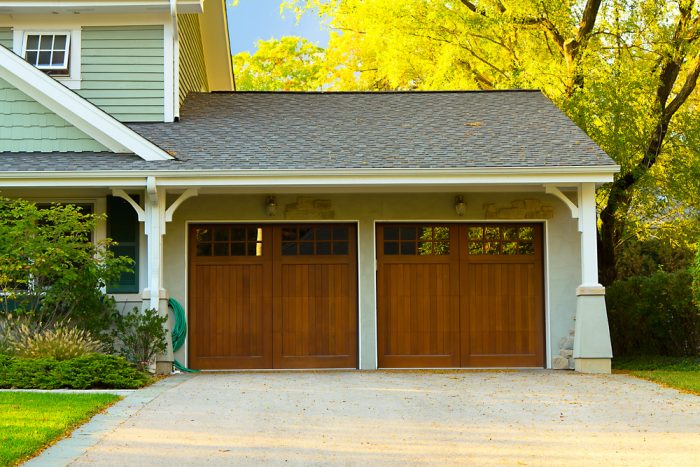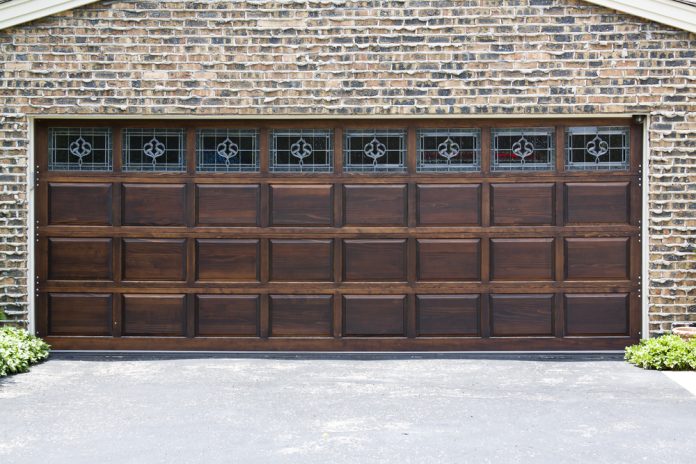Bigger than your front door, your garage door can have a huge impact on the overall curb appeal of your entire residential property. It’s more than just an entryway for your car — it also makes a statement about your home’s style and personality.
Whether you prefer a modern, eye-grabbing design, or you’re more of a timeless, classic fan, you want to choose a garage door material that perfectly aligns with your home’s exterior. But, with numerous garage door materials available today, how do you pick the right one?
This article enumerates the different types of garage door materials along with their pros and cons so you can choose the best one for your home.
1. Steel Garage Doors
Steel is probably the most common type of material used for garage doors, thanks to its durability and cost-effectiveness.
Steel garage doors are known for being lightweight and flexible, while ensuring sturdiness. Plus, they’re a lot cheaper than other materials, specifically wood. With steel garage doors, you also have an endless number of design and color options.
In addition, steel garage doors work well in all kinds of climates. If you live in a cold, snowy area, you can simply choose to add insulation to your garage doors to help in that aspect. Plus, insulation also helps strengthen the steel doors and increase your home’s value.
Despite its numerous benefits, a steel garage door also has shortcomings. For one, steel doors are prone to corrosion and rusting, especially at the bottom. This is particularly true if you live in a snowy or rainy area. If you accidentally scratched the door, it increases the chance of rusting.
Compared to other materials available, steel is also a bit more prone to general wear and tear. However, as long as you religiously maintain your door and keep up with its regular cleaning schedule (at least twice a year), a steel door should provide you with years of service without breaking the bank.
2. Fiberglass Garage Doors
Most homeowners often overlook fiberglass when choosing a garage door material. This is because it’s not as popular as other materials, such as steel and wood.
However, fiberglass garage doors most closely imitate the defined grain texture of real wood. But, unlike wood, a fiberglass garage door won’t warp, crack, or shrink, making it particularly suitable for those living in humid areas.
In addition, you can find fiberglass doors on raised panels or overlay designs. These provide a low-maintenance and practical alternative to wood. Also, since fiberglass is semitransparent, it allows natural light into your garage, unlike other materials.
That said, fiberglass is only suited if you live in warmer climates. Along with humid and rainy areas, it’s also not suited for windy coastal locations. The high winds can damage the fiberglass and create an irritating noise. Also, take note that fiberglass can’t be repaired if damaged. You’ll have to replace the door entirely.

3. Wood Garage Doors
Wood is another popular option for garage doors. Its main advantage is its looks, adding a beautiful appeal to your home’s exterior.
While other garage door materials like fiberglass can be made to imitate wood, they don’t hold a candle to the authentic, rustic appeal of wooden doors. You can also stain your wood garage door in varying colors to customize it to your liking.
Unlike steel, wood is also a natural insulator. It’s also eco-friendly and is suitable for homeowners who want to add a distinctive country aesthetic to their homes.
Despite the pros, wood has a lot of downsides. Its major disadvantage is that it’s not as durable as other options. It’s also expensive — both the upfront costs and maintenance to preserve its beauty. A wood garage door can fade, warp, chip, or rot without proper maintenance.
In addition, wood doors only work best in moderate climates. Heavy snow and constant rain can ruin a good wood. Plus, wood can be quite heavy and difficult to operate.
4. Glass Garage Doors
If you’re looking for a contemporary material to showcase your luxury cars, then a glass garage door is a good option. In general, this type of garage door often uses glass and aluminum framing.
A glass garage door can create a unique statement and set it apart from the rest of the neighborhood. In terms of functionality, glass won’t warp or rust like other materials. It’s also low-maintenance and allows for plenty of natural light in your garage.
Obviously, glass isn’t as strong or durable as the rest of the materials on this list. A hail storm or a stray stone can easily result in broken glass. The doors are also less waterproof and offer less privacy. However, you can find glass materials that have been tinted or treated to increase privacy without losing natural light.
Takeaway
Choosing the right garage door material can feel daunting for the average homeowner with the numerous options available. Hopefully this article has helped shed some light on the different garage materials so you can choose the right one for your needs.
Find a Home-Based Business to Start-Up >>> Hundreds of Business Listings.
















































